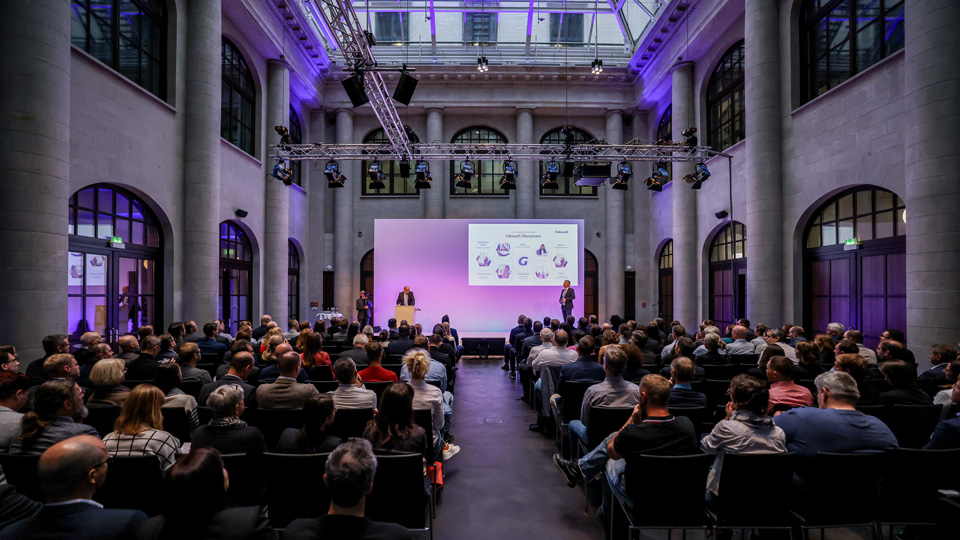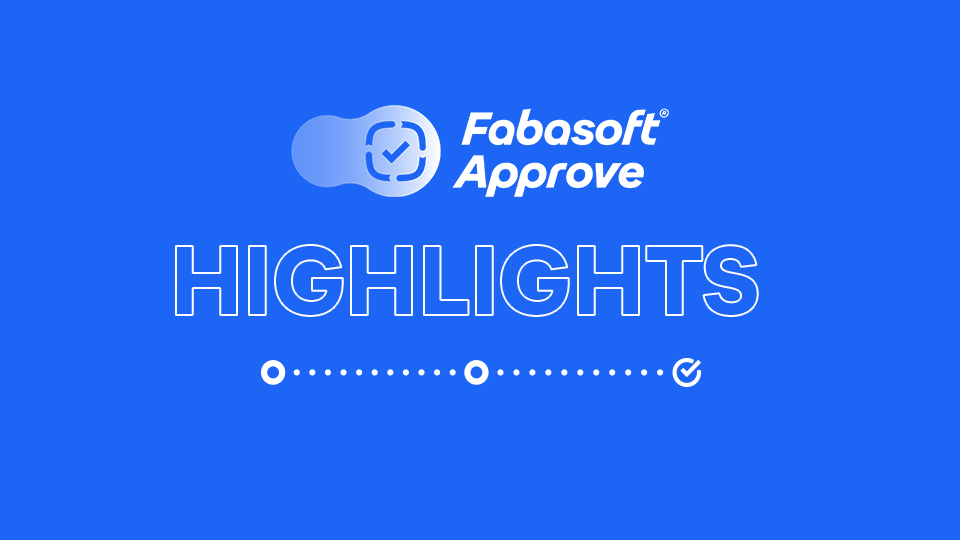The participants at Fabasoft egovday 2024 were unanimous: administrative processes can be automated in almost 60% of cases. This shows how great the potential is for more efficient public administration.
In their keynote speech, Matthias Wodniok and Andreas Voglmayr emphasized how crucial artificial intelligence (AI) and cloud natives are for optimizing workflows and increasing efficiency. Her presentation also kicked off a day full of innovation:
- Automating administrative tasks with artificial intelligence
- Successful digital transformation of Fabasoft customers
- The path to agility and scalability with cloud native
Watch the video for impressions of the event in the heart of Berlin.
Innovation and artificial intelligence in public administration
Roman-Tibor Stache from the Ministry of Labour, Social Affairs, Transformation and Digitization in Rhineland-Palatinate explained how cross-client, networked work makes it possible to break down silo thinking and optimize processes across the board. He described the "E-Akte" as the tool for the digitalization of administration, which, as a modern working instrument, also makes the ministry attractive on the job market.
Chatting with the file
Stefan Arnold presented how the latest product innovations of the Fabasoft eGov-Suite provide concrete answers to the current challenges of public administration. Using various live demos, he showed, among other things, the latest improvements to XDOMEA, everything to do with the further development of the Fabasoft app and the stamp with metadata.
As a special highlight, he demonstrated the Mindbreeze InSpire AI Chat, which, with the new “Chat with the file” function, enables simple generation of summaries taking into account the existing data set.
Automation of routine tasks
Christian Distelberger and Jens Hagemann from Fabasoft showed how Done! on Fabasoft eGov uses intelligent technologies to automate manual and repetitive tasks and make more efficient use of existing knowledge. By classifying and assigning incoming mail, checking for completeness and dispatching, Done! acts as a digital assistant throughout the entire workflow. Every process step is fully documented and traceable.
Would you like to find out more about intelligent automation? Find out more at the Done! on Fabasoft eGov Landingpage.
Rule creation using natural language
As part of a technology preview based on Mindbreeze AI, Christian Distelberger presented the “assisted rule editor”. This enables users to create automation rules using natural language and without programming knowledge.
Efficient session management
Boards on Fabasoft eGov, presented by Stefan Hänni, optimizes collaboration in committees and simplifies meeting management. By connecting all participants and providing an intuitive user interface, Boards enables secure preparation, efficient execution and transparent documentation of meetings. In several live demos, Hänni demonstrated how Boards maps the entire application life cycle and thus ensures greater efficiency and transparency in decision-making processes.
Successful customer projects and new developments
Success factors in communication during the introduction of the DMS in Hessen
Andreas Horx and Dr. Christine Korn from the Hessian Ministry for Digitalization and Innovation reported on the process of successfully implementing the new document management system (DMS) in Hesse. They identified four essential success factors for the project:
- Administrative digitization: it takes the courage to change and to dare to try something new.
- Requirements management: It is particularly important to establish a common understanding of the specific requirements. The focus here is on exchange and close cooperation between administration, project management, IT and the product supplier.
- Expectation management: To counteract negative expectations on the part of employees, it is essential to take reservations about new things seriously and look for solutions as well as emphasize the advantages of the changeover.
- Standardization: The aim must be to standardize processes by defining organizational standards for electronic file management in order to enable a user-friendly DMS system for all employees.
The two speakers emphasized that, in addition to the technology, communication and acceptance management are crucial to the success of the project. In summary, Andreas Horx and Dr. Christine Korn stated that the introduction of a DMS is not just an IT project, but above all an organizational change project.
Low-code/no-code in application procedures
Katja Rösler and Christine Letschert from the Federal Office for Logistics and Mobility (BALM), together with Lukas Becker from Fabasoft, gave an insight into the use of digital services in the federal authority in a break-out session. In collaboration with Fabasoft, "BALM" is currently planning the introduction of low-code/no-code in application procedures and, in parallel, the implementation of Done! in order to relieve employees of those activities where this is possible through intelligent automation.
Implementation of the Online Access Act
In a break-out session, Reiner Gauchel from the Federal Railway Authority and Stephan Wiesner from Fabasoft presented an insight and outlook on the implementation of the Online Access Act (OZG). This and the associated connections to the identity providers "DeutschlandID" and "Mein Unternehmenskonto (MUK)" enable the Federal Railway Authority to offer services such as the electronic transmission of application data, planning documents and documents as an administrative procedure without media discontinuity
Next steps in the federal e-file measure
Markus Schulmeyer and Rebecca Lorenz from the ITZBund presented the current status, challenges and next steps in the federal e-file measure of the IT service consolidation. As the central operator of the federal e-file, the ITZBund stands for digital sovereignty and digital change, secure operation in sovereign data centers and support and optimization of processes without media discontinuity. The two speakers see great potential in completely replacing many routine tasks that are currently still performed by qualified employees with AI in order to counteract the shortage of skilled workers.
Cloud native: the future of IT infrastructure
Cloud native technologies offer new dimensions for application operation. Fabasoft speakers Christoph Jerschitz and Kübra Senay presented why a traditional monolithic software architecture is increasingly reaching its limits in modern data centers. The conversion of data centers to a cloud native architecture offers numerous advantages, especially with regard to the requirements for agility, scalability and resilience.
You can find out more about cloud native technology in this Blog post.
New standards for the administration of the future
Fabasoft egovday 2024 impressively illustrated how digital technologies, especially AI and cloud native technologies, are transforming public administration.
Many thanks to all speakers and participants for a successful event.



